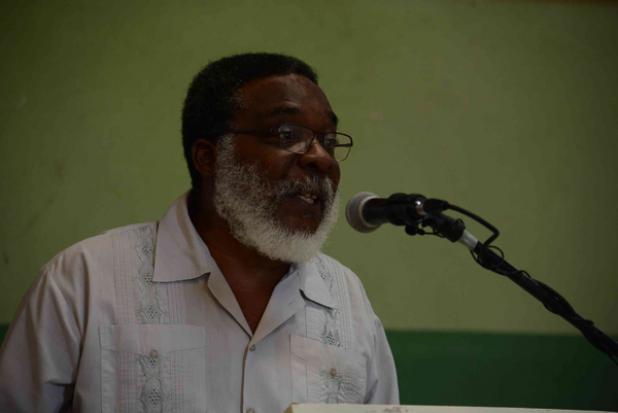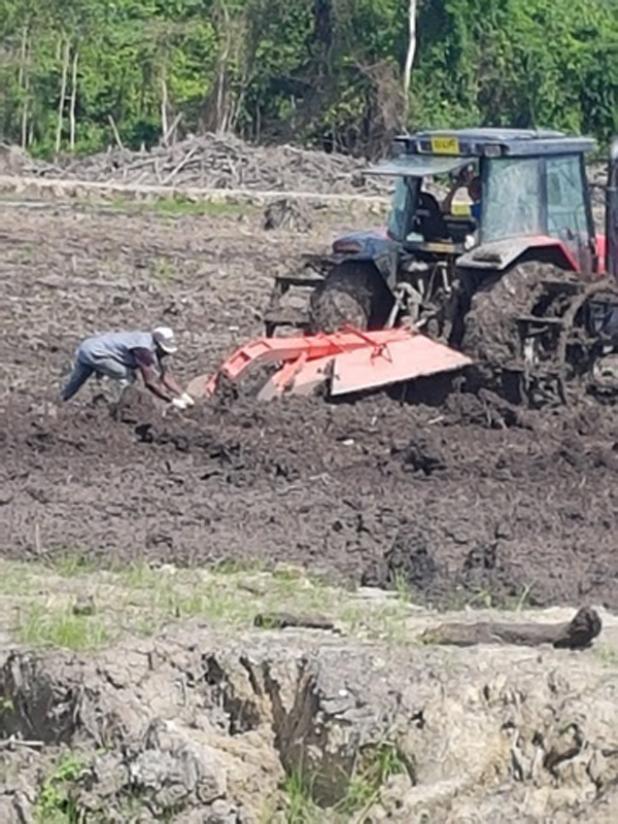
Lennox Chandler, Technical Advisor to the agriculture aspect of the Brokopondo Programme of Action

Pictured here is land being being prepared for the prospective Barbadian farmers.
Pilot project to start soon
Preparatory work is well underway in terms of cooperation on agriculture between Barbados and Suriname, and if everything goes to plan the pilot farming project should start in just a few weeks’ time.
That’s according to Lennox Chandler, Technical Advisor to the agriculture aspect of the Brokopondo Programme of Action, which commenced in 2018 and runs until 2021. Chandler told The Barbados Advocate that on land made available to Barbados by the Government of Suriname, Barbadian farmers are set to engage in crop production on a commercial trial plot, which will be used to evaluate various crops and how they perform under Suriname’s conditions. Chandler, the recently retired Chief Agricultural Officer in the Ministry of Agriculture, said his desire is to have a team on the ground no later than mid-February, but he is hoping they can arrive in Suriname from the first week in next month.
“The plan is to send some technical people from Barbados to Suriname, along with some farmers, as the agreement is for us to develop a 30 to 40-acre commercial trial plot... On that commercial plot we want to plant corn, soya, onions, carrots, pigeon peas as well as things such as aloe vera, ginger and passion fruit,” he disclosed.
Chandler went further, stating that that aspect of the programme is expected to run for three and a half to four months at the most. He indicated that once it is completed and they have the necessary data and a good understanding of how the crops perform there, it will pave the way for more Barbadian farmers to go to Suriname. He therefore anticipates that by year end several Barbadian farmers will be Suriname engaged in viable crop and livestock farming entreprises.
“We have been allocated the lands in a place called Tawajari and there are other lands in Victoria which is an old oil palm plantation which is about 4000 acres; Tawajari is about 2500 acres. The plan is, if we exhaust Tawajari to move to Victoria. But Tawajari right now is in a greater state of readiness for planting to commence,” he said.
Chandler’s remarks came as he revealed that given the secluded nature of the property to be used in the South American country, housing is being built on the farm to accommodate both the farmers and the technical personnel from the Ministry. He indicated that the housing, which is being constructed by a Surinamese company is being facilitated by funds from the Government of Suriname with assistance from the Government of Barbados.
“Suriname is not like Barbados, the land is remote, far from any city centre or town, so you have to live on the land. Obviously everybody doesn’t have to go to Suriname and farm, people can form grouping, cooperatives or partnerships where some people can stay here and some go out and farm. My thinking is, we should form small co-ops so that we can get the investment... The government may put in a start-up fund or seed financing, but essentially people will still have to raise some of their own money,” he explained.
Chandler drawing reference to the farm labour programme that Barbadians have been involved in for several years, he said the agricultural programme in Suriname is quite similar. The difference, he noted, is that the farmers are working for themselves.
“If you can go to Florida and cut canes and Canada to pick fruit, you can go to Suriname and work the land for yourself,” he insisted.
He made the point while noting that the interest being shown in the agricultural component of the Brokopondo Programme of Action is high, and increasing. As such, Chandler is confident there will be no shortage of farmers willing to pursue a venture in Suriname.
“I think it is a good opportunity for us to see that [land] as an extension of Barbados’ agricultural space and utilise it to the best of our ability, because we can benefit from it. Both Barbados and Suriname can benefit, they can sell stuff to us and we will be able to produce our own produce, which would go a long way also in reducing the food import bill and ensuring food security and food sovereignty for Barbados,” he surmised. (JRT)
